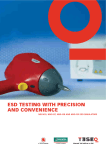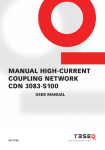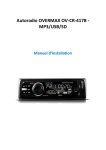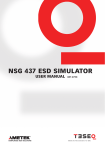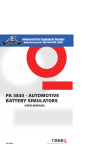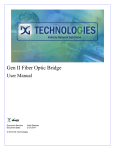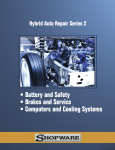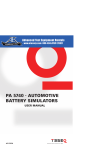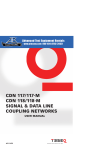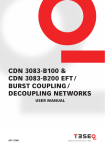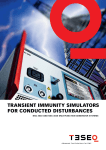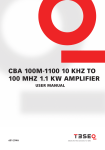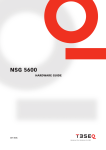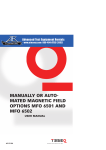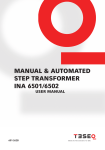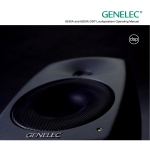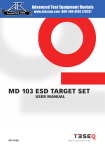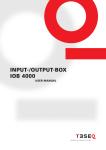Download ESD TESTING WITH PRECISION AND CONVENIENCE
Transcript
ESD TESTING WITH PRECISION AND CONVENIENCE NSG 435, NSG 437, NSG 438 AND NSG 439 ESD SIMULATORS a TESEQ Company a TESEQ Company HIGH FUNCTIONALITY Ergonomic design Perfect weight distribution User friendly touch panel display Interchangeable discharge networks Battery powered WHY ELECTROSTATIC DISCHARGE TESTING? ESD – high frequency pulse components help diagnose immunity failures. The simulation of electrostatic discharges is an important part of electromagnetic compatibility testing for any type of electronic equipment and is a particularly critical component of EMC test strategies. ESD tests are used to verify complete systems and duplicate disturbances in installations. These tests contribute to identify immunity failures caused by bad cabling or system composition, as well as grounding problems. Teseq®’s ESD simulators fulfill the requirements of all major ESD standards. Special care has been taken to satisfy the discharge holding time of at least five seconds demanded by the standard. Thanks to stabilized HV output all Teseq® simulators exceed this need by far and guarantee optimized reproducibility of tests. The basic models are type-approved and calibrated to IEC/ EN 61000-4-2. A comprehensive range of additional network modules is available for testing to other standards including ISO 10605 and various product standards. Teseq® provides a traceable calibration certificate with each simulator. Accredited calibration services are also available from Teseq® calibration labs upon request. An innovative ESD operating concept that provides conformity to both today’s and tomorrow’s standards. Combining easy operation and ergonomic design with highly sophisticated functionality, Teseq®’s ESD simulators combine all the features of a comprehensive ESD test system in a compact hand-held instrument. Ergonomic design and advanced functionality. The pistol-shaped NSG 435, NSG 437 and NSG 438 simulators are designed to sit comfortably in the operator’s hand, with current operating conditions constantly displayed and clearly visible. All ESD simulators have been ergonomically designed to be held easily for long duration test procedures. The NSG 435’s LCD panel is clearly visible at all times in the operating position and all controls are placed conveniently at the user’s fingertips. Even more convenient is the touch panel display of the NSG 437 and NSG 438 with keypad functions for setting test parameters. 3 NSG 435 – COMPACT AND COST - EFFECTIVE The NSG 435’s microprocessor-based controller and multifunction keypad provide the operator with instant access to its comprehensive range of built-in functions. The LCD panel continuously displays the operating status and all user-selected test parameters. The simulator also includes a discharge pulse counter as well as a counter for long duration tests and remote use. The NSG 435 has its own internal, battery operated high voltage generator producing pulses up to 16.5 kV. In addition to the pre-programmed, standard IEC pulses, the user can create custom tests using single or repetitive discharges with selectable rates and manual or automatic polarity switching. An optional mains supply is available for extended test operation or for use when the battery is being charged. Both measure and display true air breakdown voltages. It also detects real or valid airdischarges, thereby avoiding misleading discharge counts. This is especially important during long term tests and remote test setups. The simulator is powered by a rechargeable battery supply, so there is no separate high voltage generator or connecting cable to hinder access to the EUT. The battery, which lasts for several days under normal test usage, can be interchanged in seconds, and recharged in just a few hours. 4 A range of interchangeable discharge networks is available, including EN, ANSI-IEEE, and ISO. The unit comes with a standard 150 pF/330 Ω discharge network for tests to IEC/EN 61000-4-2. The discharge voltage of up to 16.5 kV for air-discharges and up to 9 kV for contactdischarges ensures a comfortable margin over the generally required test levels. The NSG 435 is supplied with standard accessories, including interchangeable test tips, a grounding cable and battery charger – all in a durable carrying case. There is an optional fiber optic remote control trigger for operation inside a screened room or enclosure. The LCD panel gives the operator a clear, continuous indication of all the test parameters, the operational status of the instrument and the current function of each of the five soft keys. The display shows the programmed voltage and actual discharge voltage after triggering with polarity indicator, number of discharges and battery status. Programmable discharge voltage 200 V to 16.5 kV Stabilized charging voltage Pre-programmed IEC/EN 61000-4-2 test settings True air-discharge breakdown voltage Battery powered Compact and light-weight design Comfortable use and convenient operation 5 NSG 437 – HIGH PERFORMANCE WITH BASIC FEATURES NSG 437 ESD simulator comprehensively fulfills virtually all international standard requirements. Based on over 20 optional discharge networks, the NSG 437 can also meet any of today’s automotive manufacturers’ standards. Furthermore, with pulse voltages of up to 30 kV, the NSG 437 supports demanding manufacturers’ R&D test procedures to determine immunity limits. NSG 437 already meets the proposed new requirements. Revisions of the ESD standards refer to a more precise definition of calibration methods and tighter specifications for pulse parameters, as discussed by ANSI and by IEC. NSG 437 generates pulses from 200 V to 30 kV, both in air- and contact-discharge operation. The simulator is simple, convenient and safe to use. The whole range of parameter setting possibilities, including polarity selection, counter functions and breakdown detection, remains fully available up to the maximum discharge voltage. The touch panel display with its keypad for parameter settings shows the precise functional and test data at any moment, perfectly arranged in a logical manner. All essential functions and actual status are displayed, with user-selectable language for convenient and safe operation worldwide. 6 The simulator contains a threshold detector to eliminate faulty discharge counts over its wide operating voltage range and applications. Only valid HV discharges are indicated. When discharges are detected, the counter or preset counter is incremented or decremented respectively – a particularly useful feature for long test runs. The detection feature can be switched off when testing EUT’s with non-conductive surfaces, such as plastic housings. A wide range of discharge networks and tips fulfills the high demand for different test applications and can be exchanged. Completed by a wide selection of rigid and flexible discharge tips, any application is possible. Molded HV discharge networks in solid cases eliminate ionization and leakage current effects. Selected combinations of RC components guarantee wave shape parameters to be within tolerances. Discharge network modules with resistance values from zero ohms combined with capacitances up to the nF-range can be simply pushed into place. Pre-programmed settings for IEC/EN 61000-4-2 and ISO 10605 ensure that the simulator is automatically set up correctly. The menu with last settings automatically comes up again after shut-down of a test sequence. Automatic self-calibration of the NSG 437 simulator is performed at every start-up. This procedure runs up to max. voltage in either polarity, thus giving confidence, that test levels are maintained within tolerances. Air- and contact-discharge up to 30 kV Light version featuring uncompromised test performance Compliant with a wide range of standards (IEC, ANSI, SAE, ISO) Touch panel display controls Easily and quickly interchangeable network modules Wide range of accessories (HV networks, tips, adapters) 7 NSG 438 – OPTIMIZED FOR AUTOMOTIVE TESTING NSG 438 ESD simulator comprehensively fulfills virtually all international standard requirements. Based on over 20 optional discharge networks, the NSG 438 can also meet any of today’s automotive manufacturers’ standards. Furthermore, with pulse voltages of up to 30 kV, the NSG 438 supports demanding manufacturers’ R&D test procedures to determine immunity limits. NSG 438 already meets the proposed new requirements. Revisions of the ESD standards refer to a more precise definition of calibration methods and tighter specifications for pulse parameters, as discussed by ANSI and by IEC. NSG 438 generates pulses from 200 V to 30 kV, both in air- and contact-discharge operation. The simulator is simple, convenient and safe to use. The whole range of parameter setting possibilities, including polarity selection, freely adjustable pulse repetition, counter functions and breakdown detection, remains fully available up to the maximum discharge voltage. The touch panel display with its virtual thumb wheel or keypad for parameter settings shows the precise functional and test data at any moment, perfectly arranged in a logical manner. All essential functions and actual status are displayed, with user-selectable language for convenient and safe operation worldwide. The simulator contains variable threshold selection to enable accurate discharge detection and to eliminate faulty discharge counts over its wide operating voltage range and applications. Only valid HV discharges are indicated. When a discharge is detected, the counter or preset counter is incremented or decremented respectively – a particularly useful feature for long test runs. The detection feature can be switched off when testing EUT’s with non-conductive surfaces, such as plastic housings. 8 A wide range of discharge networks and tips fulfills the high demand for different test applications and can be exchanged. Completed by a wide selection of rigid and flexible discharge tips, any application is possible. Molded HV discharge networks in solid cases eliminate ionization and leakage current effects. Selected combinations of RC components guarantee wave shape parameters to be within tolerances. Discharge network modules with resistance values from zero ohms combined with capacitances up to the nF-range can be simply pushed into place. Pre-programmed settings for IEC/EN 61000-4-2 and ISO 10605 ensure that the simulator is automatically set up correctly and the appropriate discharge network is installed. The actual R/C value is displayed at all times. Users can create and store test conditions in the instrument‘s memory for subsequent reuse. The menu with last settings does automatically come up again after shut-down of a test sequence. A list of saved test conditions can be called up at any time. A built in optical interface enables external control of the simulator. Safety interlock. The high-voltage simulator can only be activated as a result of a deliberate actions by the user. In all other cases, the instrument switches itself off automatically. An integral interlock system allows setting up accessibility and safety configurations even in combination with other test instruments. For extra safety an emergency stop switch is built in. Air- and contact-discharge up to 30 kV Compliant with a wide range of standards (IEC, ANSI, SAE, ISO) Built-in ISO self-calibration procedure Powered by high-energy battery pack Touch panel display controls Easily and quickly interchangeable network modules Adjustable discharge detector 9 With the built-in ISO calibration self-test feature considerable time can be saved by eliminating extra calibration and functional measurements before starting a test procedure as required by the ISO standard. The calibration routine is configured for all required voltage levels in either polarity and summarized in a convenient, easy to read table form including relevant tolerances. The freely adjustable pulse repetition rate ranges from 0.04 s to 300 s. This allows greatest flexibility for R&D purpose and some specific product standards, where the prestored pulse repetition rates may not match all requirements. A special random generator function is provided for non-standard interference immunity tests. The controlled statistical repetition rate of pulse triggering can be programmed in either pulse or time mode. Thereby major benefits are experienced primarily for multi-clock systems by cutting down overall test time considerably. In conjunction with an optional charge remover, it is possible to program the time to complete discharge of the charged EUT via bleed-off resistor, and the delay time until the next pulse takes place. This option enables the EUT to be reset to a defined status (ground potential) before the next discharge occurs. NSG 438 is packed in a convenient and stable carrying case with space for accessories. 10 NSG 439 – FULLY AUTOMATED ROBOTIC ESD TESTING Complete system solution with 30 kV ESD simulator for robotic applications Compact and specially designed housing Unique robotic air-discharge adapter Fully compliant with IEC/EN 61000-4-2 and ISO 10605 Robot attachment points on multiple enclosure faces Easily and quickly interchangeable networks Today’s growing trend towards miniaturizing and more comprehensive product standards means that ESD testing is now required not only for operating controls, but also for any associated peripheral devices such as sensors, actuators and controllers. Many of these devices have multi-pin connectors with high pin counts. In order to meet space restrictions, these pins are often arranged close together. With an innovative robotic air-discharge adapter accessory, Teseq® provides a tool which will prevent unintentional discharge paths. However, conventional air-discharge testing of these closely spaced pins is problematic because the air-discharge arc may jump to an adjacent pin instead of the pin intended for test. Furthermore, the approach speed, which is crucial for reliable air-discharge testing, can be programmed as a constant. ESD testing of connectors often requires that each individual pin is tested for an extensive range of conditions including multiple discharges, polarities, voltage settings, and even R/C networks. Connector testing can take many hours or even days of monotonous, precise effort to complete. As a result, when this testing is done manually it is prone to errors. The advantage of robotic testing is that these procedures can be automated and precisely executed, ensuring a level of repeatability that cannot be achieved with manual testing. NSG 439 has been designed to withstand the large acceleration forces found in harsh robotic environments. The ESD simulator includes all NSG 438 functions, and supports the complete set of discharge networks and optional discharge probes. In order to guarantee the greatest possible functionality, Teseq® offers the NSG 439 only as a complete test station including the robotic mechanism, ESD simulator, control software, test bench and interlocked enclosure. 11 TECHNICAL SPECIFICATIONS Information NSG 435 NSG 437 NSG 438 / NSG 438A / NSG 439 Description Compact ESD simulator with microprocessor-based, large LCD panel, built-in HV relay for contact–discharge, battery and mains operation Compact ESD simulator with microprocessor-based, large touch-sensitive LCD panel, built-in HV relay for contact-discharge, mains operation Compact ESD simulator with microprocessor-based, large touch-sensitive LCD panel, built-in HV relay for contact-discharge, battery and mains operation Basic set Carrying case with: Electrostatic discharge simulator Battery pack Battery charger 100 to 240 VAC Discharge network 150 pF/330 Ω Air- and contact-discharge tips Grounding cable Tripod adapter User Manual Package with: Discharge pistol High voltage base unit Mains power supply adapter (100 to 250 VAC) Discharge network 150 pF/330 Ω Air- and contact-discharge tips Grounding cable User Manual Carrying case with: Discharge pistol Cradle for discharge pistol High voltage base unit with built-in battery pack Mains adapter and battery charging unit (100 to 250 VAC) Discharge network 150 pF/330 Ω Air- and contact-discharge tips Grounding cable User Manual 25 mm discharge sphere Pulse data Standard: Conforms to IEC/EN 61000-4-2 (2001) Standard: Conforms to IEC/EN 61000-4-2 (2001) Standard: Conforms to IEC/EN 61000-4-2 (2001) Special: Interchangeable networks for other standards Special: Interchangeable networks for other standards Special: Interchangeable networks for other standards Network 150 pF/330 Ω as per IEC/EN 61000-4-2 ed 2.0 Network 150 pF/330 Ω as per IEC/EN 61000-4-2 ed 2.0 Network 150 pF/330 Ω as per IEC/EN 61000-4-2 ed 2.0 Range of R/C-networks for other standards: R = 0 Ω to 10 k Ω C = 60 pF to 500 pF Optional ISO 10605 networks 150 pF/2 k Ω and 330 pF/2 k Ω. Range of R/C-networks for other standards: R = 0 Ω to 20 k Ω C = 50 pF to 2000 pF Optional ISO 10605 networks 150 pF/2 k Ω and 330 pF/2 k Ω Range of R/C-networks for other standards: R = 0 Ω to 20 k Ω C = 50 pF to 2000 pF Air-discharge 200 V to 16.5 kV (in 100 V steps) Air-discharge 200 V to 30 kV (in 100 V steps) Air-discharge 200 V to 30 kV (in 100 V steps) Contact-discharge 200 V to 9 kV (in 100 V steps) Contact-discharge 200 V to 30 kV (in 100 V steps) Contact-discharge 200 V to 30 kV (in 100 V steps) Ball and point as per IEC, fast risetime; exchangeable by threaded cap Ball and point as per IEC and specials; exchangeable by threaded cap Ball and point as per IEC and specials; exchangeable by threaded cap Pulse networks Discharge voltage Discharge tips 12 Information NSG 435 NSG 437 NSG 438 / NSG 438A / NSG 439 Charging voltage kV, accuracy better than ±5% (stabilized); measurement and display of true air flashover voltage kV, accuracy better than ±5% (stabilized) kV, accuracy better than ±5% (stabilized) Indicated by an oval around the kV symbol, also acoustically in the ‚Single‘ operating mode Indicated by the kV symbol being displayed in inverse, also acoustically in the ‚Single‘ operating mode. Threshold level on/off Indicated by the kV symbol being displayed in inverse, also acoustically in the ‚Single‘ operating mode. Adjustable threshold level Holding time > 5 s (charging voltage ±5%) > 5 s (charging voltage ±5%) > 5 s (charging voltage ±5%) Charge resistor 50 MΩ 50 MΩ 50 MΩ Triggering Trigger button in hand-grip or via remote control input Trigger button in hand-grip Trigger button in hand-grip or via remote control input Operation Via push-buttons and microprocessor Via touch screen and microprocessor Via touch screen and microprocessor Discharge modes Air-discharge / Contact-discharge Air-discharge / Contact-discharge Air-discharge / Contact-discharge Polarity Positive / negative / automatic change Positive / negative / automatic change Positive / negative / automatic change Operating modes Single / repetitive Pulse counter 0 to 9999 Pre-select counter 0 to 9999 Repetition: 0.5/1/5/10/20 or 25 Hz (air) 0.5/1/5 or 10 Hz (contact) continuous operation Single / repetitive Pulse counter 0 to 9999 Pre-select counter 0 to 9999 Repetition: 0.5/1/5/10/20 or 25 Hz (air) 0.5/1/5/10 or 20 Hz (contact) continuous operation Single / repetitive / random (time / pulse) Pulse counter 0 to 9999 Pre-select counter 0 to 9999 Repetition: 0.5/1/5/10/20 or 25 Hz (air) 0.5/1/5/10 or 20 Hz (contact) freely selectable from 0.04 s to 300 s continuous operation Built in charge removing (NSG 438A only) Auto-shut-off After 30 minutes idle time (without loss of the test parameters) No auto-shut-off After 15 minutes idle time (without loss of the test parameters) Display LCD panel showing: Charging voltage Discharge voltage Polarity Air-/contact-discharge Counter/preselect counter content Soft-key functions Battery monitor LCD panel showing: Charging voltage Breakdown event Polarity Air-/contact-discharge Counter/preselect counter content LCD panel showing: Charging voltage Breakdown event Polarity Air-/contact-discharge Counter/preselect counter content Network parameters Battery monitor Weight Pistol with battery: 1.2 kg (2.6 lbs) approx. Discharge pistol (w/o cable): 1.2 kg (2.6 lbs) approx. Base unit: 5.7 kg (12.6 lbs) approx. Discharge pistol (w/o cable): 1.2 kg (2.6 lbs) approx. Base unit: 6.5 kg (14.3 lbs) approx. Ambient Operation: +5 to +40°C 20 to 80% r.h. (non-condensing) 68 to 106 kPa Operation: +5 to +40°C 20 to 80% r.h. (non-condensing) 68 to 106 kPa Operation: +5 to +40°C 20 to 80% r.h. (non-condensing) 68 to 106 kPa measurement Discharge detection (air-discharge only) conditions 13 ACCESSORIES Accessories NSG 435 Basic set (see technical specifications) Part Number Mains power supply (80 to 240 V, 50 / 60 Hz) INA 402 01-05 Spare battery pack. Make sure the right charger gets used, as older chargers are not suited for new batteries. INA 405 Remote triggering unit incl. 5 m opto-cable INA 415 Opto-link to a PC with 10 m opto-cable INA 417B Special test tip for fast rise time. Where the rise time of 0,8 ns specified in most standards represents more than 80% of real cases, in extreme cases an ESD event may be faster. This can be simulated using this fast rise time test finger which generates rise times around 0,4 ns. INA 420 Tripod support for NSG 435 INA 423 Air discharge tip for NSG 434 and NSG 435 INA 424 Contact discharge tip for NSG 434 and NSG 435 INA 425 Special discharge networks (specify R and C) INA xxx Accessories NSG 437 / 438 / 439 Basic set (see technical specifications) Part Number Opto-link set to a PC with 10 m opto-cable (INA 417B is not suitable with NSG 437) INA 417B Discharge network, 150 pF/330 Ω, per: IEC 61000-4-2 (2008), ISO 10605 (2001), (2008) INA 4380 Discharge network, 150 pF/2 kΩ, per: ISO 10605 (2001), (2008), SAEJ1113-13, GMW3091, GMW3094, GMW3097, GMW3100 INA 4381 Discharge network, 330 pF/2 kΩ, per: ISO 10605 (2001), (2008), SAE J1113-13 INA 4382 Discharge network, 150 pF/330 Ω, per: ANSI C63.16 - Hand/metal model INA 4383 Discharge network, 150 pF/75 Ω, per: ANSI C63.16 - Air discharge furniture model INA 4384 Discharge network, 150 pF/15 Ω, per: ANSI C63.16 - Contact discharge furniture model INA 4385 14 ACCESSORIES Fast risetime test tip. Where the rise time of 0,8 ns speficied in most standards represents more than 80% of real cases, in extreme cases an ESD event may be faster. This can be simulated using this fast rise time test finger which generates rise times around 0,4 ns. INA 4411 Remote discharge tip with extension (specify R value xx). For applications where ESD pistol needs to stay away from EUT. Consists in banana tip, HV extension cord of 1,5 m, ended with resistor unit and set of air and contact test finger. INA 4413-xx Air discharge ball (Discharge sphere). 25 mm diameter test tip adapter to be fixed on 8 mm air discharge test finger. To minimize corona discharge when testing in air discharge mode for higher voltages. INA 4414 Flexible tip set. Where the application makes access of EUT discharge point difficult. Approx. 30 cm flexible extension adapter tips. Set of 2 tips, for air discharge and contact discharge mode. INA 4415 Soft touch contact tip. Very convenient adapter tip to test connector pins. INA 4416 Banana contact tip. To adapt to 4 mm banana plugs. INA 4417 Banana fastrisetime tip. To adapt to 4 mm banana plugs. INA 4418 E-field adapter INA 4419 H-field adapter INA 4420 Tripod support for NSG 437, 438. To adapt NSG 437 or 438 pistols to classics tripods as generally used for cameras. INA 4421 Carry case for NSG 437/438. Includes foam with professional cut outs for NSG 437, 438 and accessories. INA 4423 Charge remover (for NSG 438 and NSG 439 series only) INA 4430 Discharge network, 100 pF/100 Ω INA 4545 Discharge network, 300 pF/30 Ω INA 4546 Discharge network, 150 pF/1500 Ω INA 4547 Discharge network, 100 pF/1000 Ω INA 4548 Discharge network, 2000 pF/150 Ω INA 4549 Discharge network, 1000 pF/2 kΩ, per: ES-X 44017 HMC (Hyundai Motor Company) INA 4550 15 ACCESSORIES Discharge network, 150 pF/500 Ω, per: JASO D001-87 and 94 INA 4551 Discharge network, 500 pF/330 Ω INA 4552 Discharge network, 330 pF/330 Ω, per: ISO 10605 (2001), (2008), TL 824 66 (VolksWagen) INA 4553 Discharge network, 150 pF/150 Ω, per: SAE J1455 A94 INA 4554 Discharge network, 500 pF/500 Ω, per: MIL-STD-464, Stanag 4239 INA 4555 Discharge network, 500 pF/100 Ω INA 4556 Discharge network, 2000 pF/0 Ω INA 4557 Discharge network, 200 pF/150 Ω INA 4558 Discharge network, 500 pF/5 kΩ, per: Stanag 4239 INA 4559 Discharge network, 200 pF/100 Ω INA 4560 Discharge network, 100 pF/1500 Ω, per: MIL 883 INA 4561 Discharge network, 330 pF/0 Ω INA 4562 Discharge network, 50 pF/0 Ω INA 4563 Discharge network, 100 pF/500 Ω, per: Chrysler PF9326-D-May 00, Chrysler LP388-C-42 INA 4564 Discharge network, 1500 pF/2200 Ω, per: VW 80972:2001-10 INA 4565 Discharge network, 150 pF/1000 Ω INA 4566 Discharge network, 150 pF/0 Ω INA 4567 Discharge network, 1000 pF/0 Ω INA 4568 Discharge network, 200 pF/0 Ω INA 4569 Discharge network, 500 pF/2000 Ω INA 4570 16 ACCESSORIES Discharge network, 500 pF/0 Ω INA 4571 Discharge network, 330 pF/27 Ω INA 4572 Discharge network, 1000 pF/1000 Ω, per: IEC 60065 INA 4573 Discharge network, 50 pF/100 Ω INA 4574 Discharge network, 100 pF/50 Ω INA 4575 Discharge network, 350 pF/200 Ω INA 4576 Discharge network, 100 pF/0 Ω INA 4577 Discharge network, 50 pF/200 Ω INA 4578 Discharge network, 650 pF/350 Ω INA 4579 Discharge network, 500 pF/500 Ω INA 4580 Discharge network, 400 pF/250 Ω INA 4581 Discharge network, 50 pF/10 Ω INA 4582 Discharge network, 50 pF/3500 Ω INA 4583 Discharge network, 250 pF/1500 Ω, per: UL 1023 INA 4584 Discharge network, 150 pF/300 Ω INA 4585 Discharge network, 200 pF/500 Ω INA 4586 Discharge network, 330 pF/500 Ω INA 4587 Discharge network, 60 pF/100 Ω INA 4588 Discharge network, 50 pF/10k Ω INA 4589 Discharge network, 250 pF/100 Ω INA 4590 17 ACCESSORIES Discharge network, 250 pF/500 Ω INA 4591 Discharge network, 1000 pF/1 Ω INA 4592 Discharge network, 500 pF/1000 Ω INA 4593 Discharge network, 20 pF/0 Ω INA 4594 Discharge network, 1000 pF/10 Ω INA 4595 Discharge network, 270 pF/100 Ω INA 4596 Discharge network, 100 pF/47 Ω INA 4597 Discharge network, 1600 pF/1500 Ω INA 4598 Discharge network, 200 pF/1500 Ω INA 4599 Special discharge networks to specification: specify standard, C and R value. Possible values: 50 pF < C < 2000 pF, 0 Ω < R < 20 kΩ INA xxxx Measurement Accessoires for all ESD Simulators Basic set (see technical specifications) Part Number Calibration adapter set to MD 103. To calibrate MD 103 per specifications of IEC 61000-4-2 (2008) and ISO 10605 (2008). INA 103 Bleeder resistor cable (2 x 470 kΩ) - lenght 80 cm INA 414 Bleeder resistor cable (2 x 470 kΩ) - lenght 2 m INA 414-2M Measuring target conforming to IEC 61000-4-2 (1995) MD 101 Target-attenuator-cable chain for ESD pulse calibration conforming to IEC 61000-4-2 (2008) and ISO 10605 (2008). MD 103 18 EMC INSTRUMENTATION AND SYSTEMS FOR ANY BUDGET Teseq® offers the world’s most comprehensive range of EMC systems for immunity and emissions testing. We take great pride in our world-class research and development program, backed by state-of-the-art global manufacturing. Our membership in the relevant international committees demonstrates our commitment to the industry. Our network of direct sales offices, representatives and distributors offers market leading EMC expertise tailored to local needs in more than 30 different countries. Our unique “modular” approach to EMC is focused on our customers’ business needs. By breaking down the barriers between traditionally separate test functions we can optimize the test process to help you bring products to market more quickly. Headquarters Teseq AG 4542 Luterbach Switzerland T +41 32 681 40 40 F +41 32 681 40 48 [email protected] www.teseq.com MILMEGA Ltd. Park Road, Ryde, Isle of Wight, PO33 2BE, UK T +44 (0) 1983 618004 F +44 (0) 1983 811521 [email protected] www.milmega.co.uk IFI Inc. 903 South Second Street Ronkonkoma, NY 11779 T +1 631 467 8400 F +1 631 467 8558 [email protected] www.ifi.com China Teseq Company Limited T +86 10 8460 8080 F +86 10 8460 8078 [email protected] France Teseq Sarl T +33 1 39 47 42 21 F +33 1 39 47 40 92 [email protected] Germany Teseq GmbH T +49 30 5659 8835 F +49 30 5659 8834 [email protected] Japan Teseq K.K. T +81 3 5774 5771 F +81 3 5774 5772 [email protected] Singapore Teseq Pte Ltd. T +65 6846 2488 F +65 6841 4282 [email protected] Switzerland Teseq AG T +41 32 681 40 50 F +41 32 681 40 48 [email protected] Taiwan Teseq (Taiwan) Ltd. T +886 2 2917 8080 F +886 2 2917 2626 [email protected] UK Teseq Ltd. T +44 845 074 0660 F +44 845 074 0656 [email protected] USA Teseq Inc. T +1 732 417 0501 F +1 732 417 0511 Toll free +1 888 417 0501 [email protected] To find your local partner within Teseq’s global network, please go to www.teseq.com Teseq® is an ISO-registered company. Its products are designed and manufactured under the strict quality and environmental requirements of the ISO 9001. 691-200E October 2013 © 2013 Teseq® Specifications subject to change without notice. a TESEQ Company This document has been carefully checked. However, Teseq® does not assume any liability for errors, inaccuracies or changes due to technical developments. a TESEQ Company




















